|

|

|
|
ディグダグ
©1982 1985 Namco Ltd.
Release: 1985-06-04 (¥4500)
Cartdridge NDD-4500
Platform game
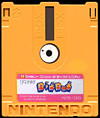

|
Released in Japan (Disk Writer) as
DIG DUG
( NDS-DIG )
|
|
Dig Dug is a platform/action game based on Namco's classic
arcade game of the same name released in 1982. The player takes control of
a character in a silver suit called Dig Dug (also known as Taizo Hori).
The fellow digs tunnels and hunts down two types of alien creatures
(Pooka & Fygar) hidden deep underneath the Earth in small underground
dwellings. The highlight of Dig Dug is the weaponry used by the main
character - no lasers, no bombs but... an air pump. This unlikely tool is used to
inflate the poor aliens until they blow up to pieces. The idea sounds really basic
at first but things quickly ramp up. The creatures come with their own bags of
tricks - they can turn into ghostly and intangible forms and fly through solid dirt
and the Fygars can even blow fire. Each screen comes with a handful of
creatures to defeat and a time limit encourages the player to hurry up and complete
his objective. Another interesting feature of Dig Dug is the way how the music
plays as long as the player keeps moving. Dig Dug features countless stages
and a two players alternate mode.
|
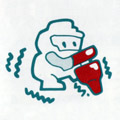 Dig Dug was an arcade game originally released in Japan 1982 by Namco
(and in the rest of the world by Atari). The game was ported to countless home
systems at the time - Atari 800 (1982), Commodore 64 (1982),
Apple II (1983), TI99 (1983), Vic 20 (1983), Atari 2600 (1983),
Atari 5200 (1983), Fujitsu FM-7 (1984), MSX (1984), NEC PC-8801,
Sharp X1, Famicom (1985), Intellivision (1987) and Atari 7800 (1987).
Dig Dug was even released as a LSI game by Gakken and appeared on many compilations
such as Namco Gallery Vol.2 (GameBoy, 1996), Dig Dug 1+2 (x68000, 1995)
and in many of the countless Namco Museum collections. A little known sequel followed
Dig Dug was an arcade game originally released in Japan 1982 by Namco
(and in the rest of the world by Atari). The game was ported to countless home
systems at the time - Atari 800 (1982), Commodore 64 (1982),
Apple II (1983), TI99 (1983), Vic 20 (1983), Atari 2600 (1983),
Atari 5200 (1983), Fujitsu FM-7 (1984), MSX (1984), NEC PC-8801,
Sharp X1, Famicom (1985), Intellivision (1987) and Atari 7800 (1987).
Dig Dug was even released as a LSI game by Gakken and appeared on many compilations
such as Namco Gallery Vol.2 (GameBoy, 1996), Dig Dug 1+2 (x68000, 1995)
and in many of the countless Namco Museum collections. A little known sequel followed
 in 1985. The arcade game was simply called Dig Dug II and featured a different
gameplay - the action doesn't happen underground anymore but on small islands. The driller
is not used to dig tunnels but to force parts of the land to collapse in the sea. The game
was ported to the Famicom (1989) and was part of Dig Dug 1+2 (x68000, 1995).
Players will have to wait ten years to play a new Dig Dug game in the arcades - Namco
released the Namco Classics Collection vol.2 in 1996 which featured Dig Dug
alongside Pac Man and Rally X. In addition to the original classics, this collection
included arranged versions with updated graphics and gameplay. This new version was called
Dig Dug Arrangement and was later included in the Namco Museum collection
released for the Game Cube, XBox and Playstation 2 in 2001. Interestingly,
in 1985. The arcade game was simply called Dig Dug II and featured a different
gameplay - the action doesn't happen underground anymore but on small islands. The driller
is not used to dig tunnels but to force parts of the land to collapse in the sea. The game
was ported to the Famicom (1989) and was part of Dig Dug 1+2 (x68000, 1995).
Players will have to wait ten years to play a new Dig Dug game in the arcades - Namco
released the Namco Classics Collection vol.2 in 1996 which featured Dig Dug
alongside Pac Man and Rally X. In addition to the original classics, this collection
included arranged versions with updated graphics and gameplay. This new version was called
Dig Dug Arrangement and was later included in the Namco Museum collection
released for the Game Cube, XBox and Playstation 2 in 2001. Interestingly,
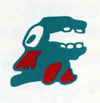 Dig Dug Arrangement was also included in the Namco Museum Battle Collection
released for the PSP in 2005 - however, this game is completely different from the
original arcade game. Finally, Dig Dug Digging Strike was released for the DS
in 2006 and it links the Dig Dug series to another arcade game series called Mr Driller
which was first released by Namco in 1999. The protagonist of the Mr Driller
series is Susumu Hori, son of Taizo Hori from the original Dig Dug.
Dig Dug Arrangement was also included in the Namco Museum Battle Collection
released for the PSP in 2005 - however, this game is completely different from the
original arcade game. Finally, Dig Dug Digging Strike was released for the DS
in 2006 and it links the Dig Dug series to another arcade game series called Mr Driller
which was first released by Namco in 1999. The protagonist of the Mr Driller
series is Susumu Hori, son of Taizo Hori from the original Dig Dug.
|
G
O
O
D
I
E
S
|
|
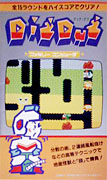
Japanese Guidebook
|
|
|
O
M
A
K
E
|
|
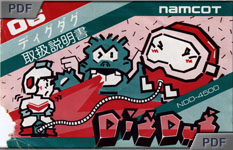

|
|
|
Click on picture to enlarge |
|
|
|
LK

|
|
Add your Pov here !
|
P
O
V
s
|
|
Dig Dug is a timeless classic created at a time when arcade games had to
innovate to survive. Tons of games in the 80s introduced unusual and smart gameplay
ideas and Dig Dug is clearly one of them (and probably one of the best). However,
how well does this conversion stand the test of time ? Surprisingly, This Famicom
port is really well done and incredibly faithful to the arcade game. The screen has an
horizontal aspect ratio (unlike the vertical arcade game) but this doesn't really affect
the gameplay in any ways. But make no mistake about it - Dig Dug is a classic arcade
game at heart and it will knock you to the ground. You're given three lives and the game will
chew them up with ease. I still have frond memories of playing the arcade game and this Famicom
version stimulated every nostalgic fiber of my being. Newcomers may find the game a bit too hard
and repetitive though...
|
|
|
|